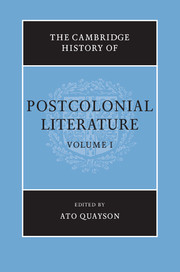Book contents
- Frontmatter
- 1 Introduction: postcolonial literature in a changing historical frame
- 2 Postcolonial fictions of slavery
- 3 Postcolonialism and travel writing
- 4 Missionary writing and postcolonialism
- 5 Postcolonial auto/biography
- 6 Orality and the genres of African postcolonial writing
- 7 Canadian literatures and the postcolonial
- 8 Postcolonialism and Caribbean literature
- 9 Postcolonialism and Arab literature
- 10 Postcolonialism and postcolonial writing in Latin America
- 11 Postcolonial writing in South Africa
- 12 Postcolonial literature in Southeast Asia
- 13 Postcolonial South Asian poetry
- 14 Postcolonial writing in India
- 15 Postcolonial writing in Australia and New Zealand
- 16 Indigenous writing in Canada, Australia and New Zealand
- 17 Postcolonial writing in Ireland
- 18 Postcolonial writing in Britain
- 19 Postcolonial writing in France
- 20 Postcolonial writing in Germany
- References
12 - Postcolonial literature in Southeast Asia
Published online by Cambridge University Press: 28 January 2012
- Frontmatter
- 1 Introduction: postcolonial literature in a changing historical frame
- 2 Postcolonial fictions of slavery
- 3 Postcolonialism and travel writing
- 4 Missionary writing and postcolonialism
- 5 Postcolonial auto/biography
- 6 Orality and the genres of African postcolonial writing
- 7 Canadian literatures and the postcolonial
- 8 Postcolonialism and Caribbean literature
- 9 Postcolonialism and Arab literature
- 10 Postcolonialism and postcolonial writing in Latin America
- 11 Postcolonial writing in South Africa
- 12 Postcolonial literature in Southeast Asia
- 13 Postcolonial South Asian poetry
- 14 Postcolonial writing in India
- 15 Postcolonial writing in Australia and New Zealand
- 16 Indigenous writing in Canada, Australia and New Zealand
- 17 Postcolonial writing in Ireland
- 18 Postcolonial writing in Britain
- 19 Postcolonial writing in France
- 20 Postcolonial writing in Germany
- References
Summary
From colonial to postcolonial in Southeast Asia
In the context of Southeast Asia, ‘postcolonial’ invokes the lasting influence of several nations, languages and cultures from which this chapter singles out the narrative of writing by anglophone authors born in societies governed for varying periods, and with varying degrees of control, by Britain and the US. ‘Southeast Asia’ is a fictional name of recent provenance which was eventually adopted by the people whose region it was meant to designate as a theatre of operations during World War II: the zone located east of India, south of China and north of Australia on any map of Asia. The usefulness of the term outlasted the war and the Cold War. Currently, it refers to a group of nations comprising Brunei, Cambodia, Indonesia, Laos, Malaysia, Myanmar (formerly Burma), the Philippines, Singapore, Thailand, Timor-Leste (formerly East Timor) and Vietnam. The grouping is formalized in international organizations such as the ASEAN (founded in 1967), and highlights three factors: geographical proximity, shared economic interests and a history of nationhood built – with the partial exception of Thailand – from the aftermath of European (and in the case of the Philippines, Spanish and American) colonialism. Although not generally considered part of Southeast Asia, we can add the territories of Hong Kong and Macao to the comparative context of this chapter: their status as British and Portuguese colonies changed to that of Special Administrative Regions of the People’s Republic of China in 1997 and 1999 respectively, giving the use of English for creative purposes in these territories additional nuances within the idea of ‘postcolonial’ cultures and literatures.
- Type
- Chapter
- Information
- The Cambridge History of Postcolonial Literature , pp. 352 - 384Publisher: Cambridge University PressPrint publication year: 2012
References
- 1
- Cited by



